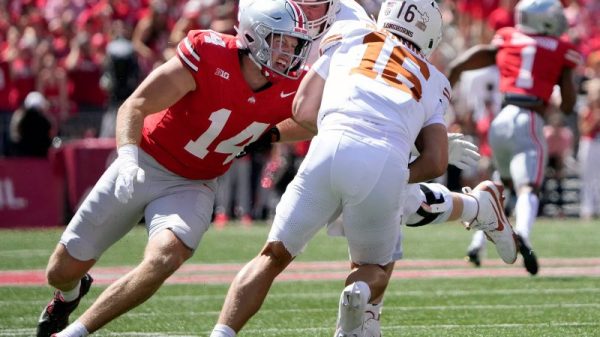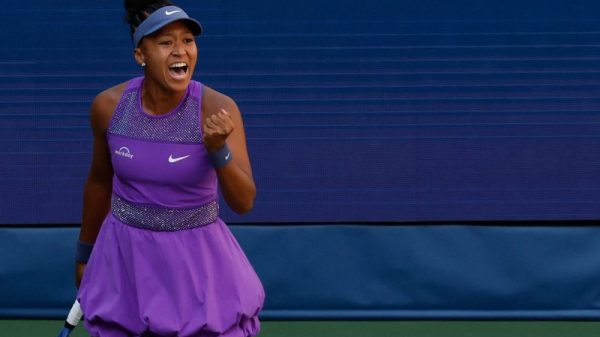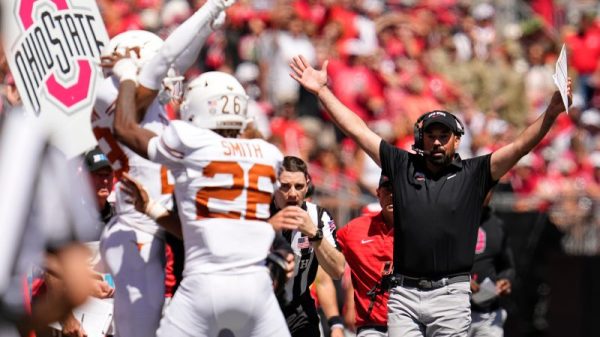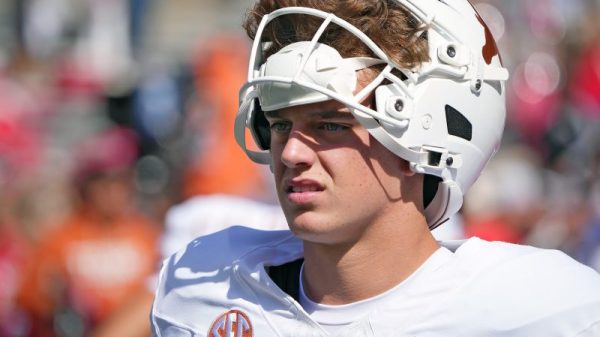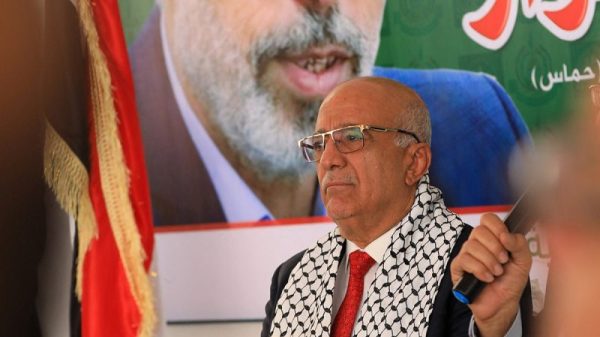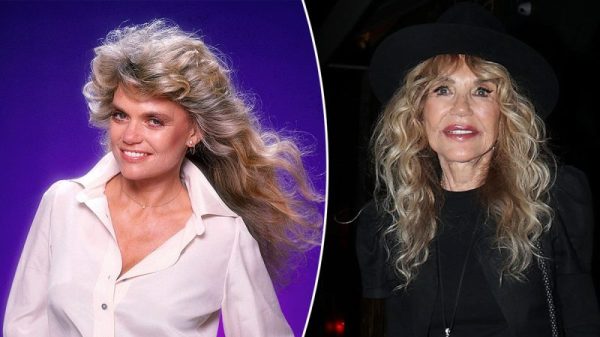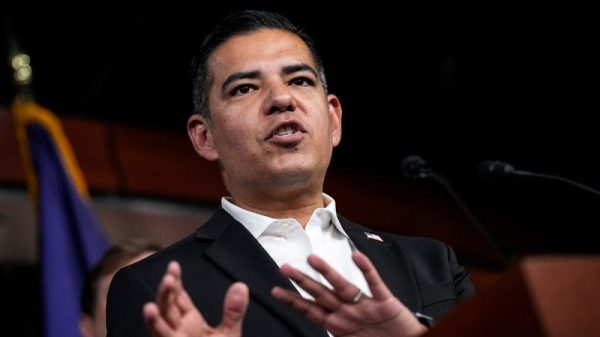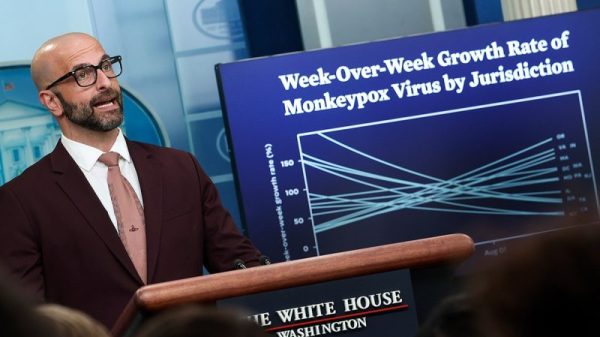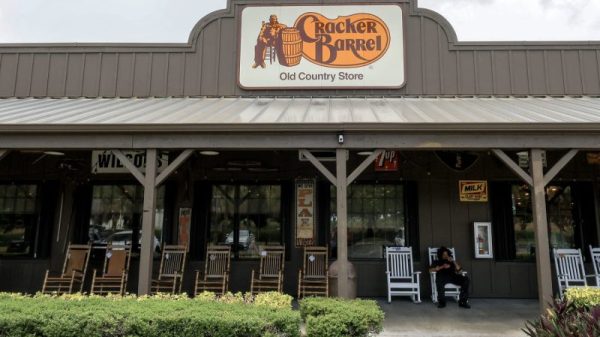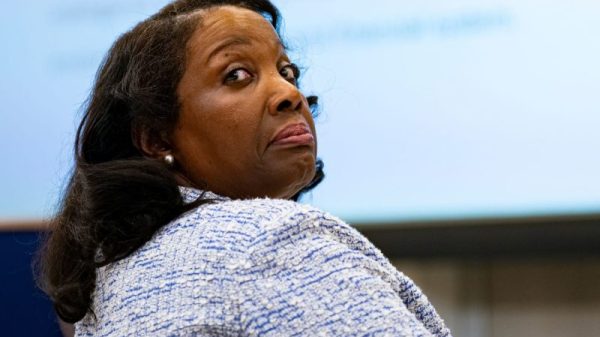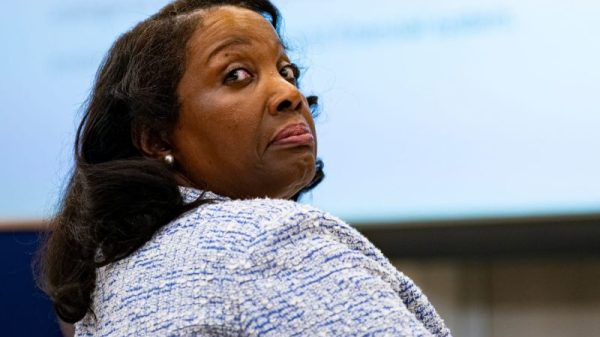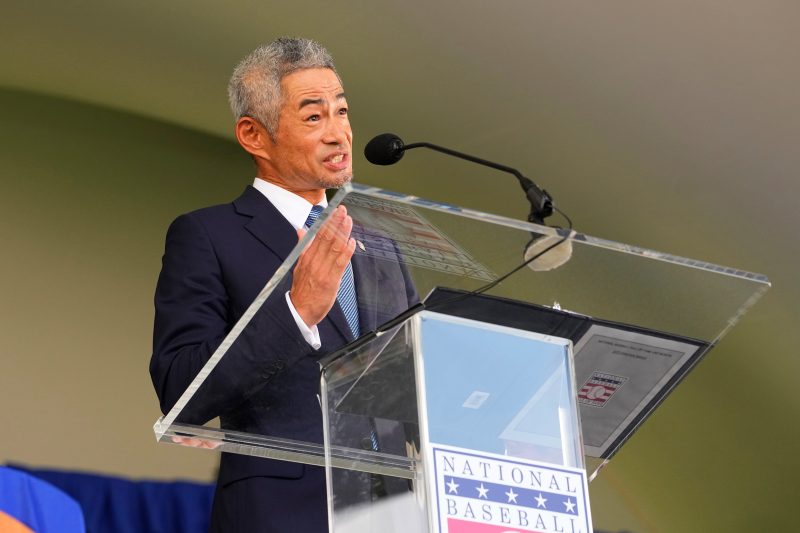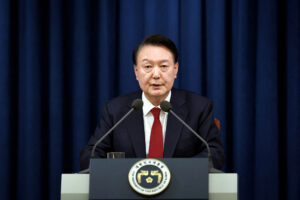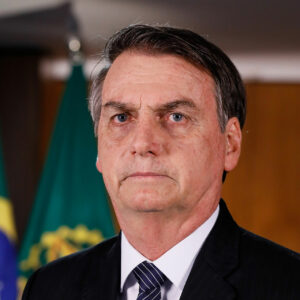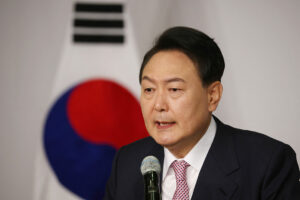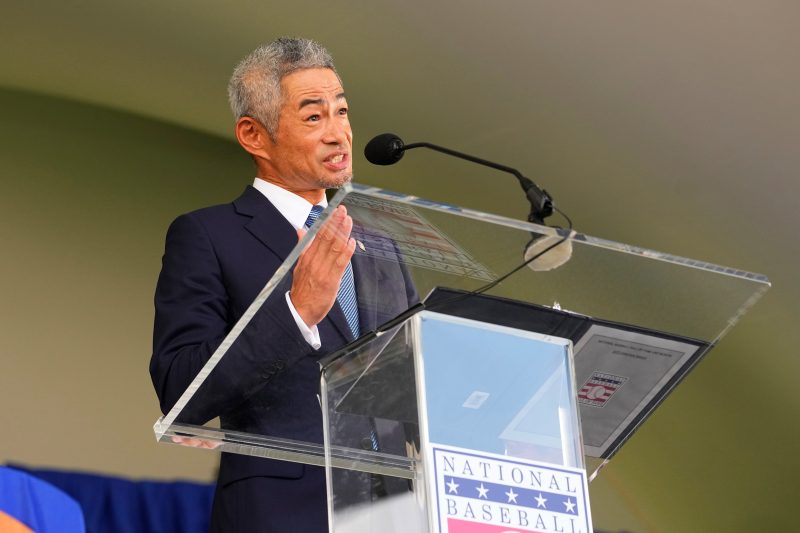
COOPERSTOWN, NY. — The day was filled with passionate speeches, inspirational messages, and ended Sunday with a comedy show by the least suspecting Hall of Famer, with most of the audience unaware he even spoke English.
Ichiro Suzuki, the first Japanese Hall of Famer in baseball history, brought down the house with one of the most humorous speeches since the late Bob Uecker.
Suzuki, who has had a full-time interpreter since he arrived in the United States in 2001, delivered his entire speech in English, cracking jokes with a perfect delivery, entertaining the crowd of 30,000 at the Hall of Fame induction ceremony. He was one of five players inducted in the 76th induction ceremony, joined by CC Sabathia, Billy Wagner and the late Dick Allen and Dave Parker.
“People often measure me by my records,’’ Suzuki said. “3,000 hits, 10 Gold Gloves, 10 seasons of 200 hits. Not bad, huh?
But the truth is that without baseball, you would say, ‘This guy is such a dumbass.”
Suzuki’s comedy act was just beginning, reciting baseball stats, his 3,089 hits, his record 262-hit season, and saying how his career was recognized by the Baseball Writers Association of America, but it still wasn’t good enough for the one anonymous writer who didn’t vote for him, preventing him from joining Mariano Rivera as the only unanimous Hall of Famers in history.
He paused, listened to the laughter from the crowd, and then with a perfect delivery said, “Oh, by the way, and that offer for that writer to have dinner at my house has now … expired.’’
He thanked the Seattle Mariners and Hall of Fame GM Pat Gillick for believing in him and signing him in 2001, thanked the New York Yankees for his 2 ½ years with them, and Hall of Famer Derek Jeter for his valuable leadership. And then thanked the Miami Marlins for extending his career for three more years, but with a twist:
“Honestly, when you guys called to offer me a contract for 2015,’’ Suzuki said, pausing again, “I had never heard of your team.’’
Suzuki’s teammates all knew that he spoke perfect English, and had a delightful sense of humor, but now the baseball world became clued into his secret.
“I played with him for three years, so I knew he could do that,’’ Sabathia said. “I was just excited for people to get to know his personality and how funny he is.’’
In the press conference after the ceremony, Suzuki said there was never any thought to delivering his speech in Japanese, saying it was important to him to provide humor to the fans and baseball officials in attendance in Cooperstown, while also making sure everyone understood the importance of respecting the game.
“I always said that being a Hall of Famer wasn’t a goal,’’ Suzuki said, “but to make people laugh here was a goal of mine.’’
The only time Suzuki spoke Japanese during his entire speech was thanking Hideo Nomo for giving him the courage to play Major League Baseball.
“Because of Hideo’s courage,’’ Suzuki said, my eyes opened to the idea of challenging myself by going somewhere I never imagined.”
Nomo was the first Japanese player in 30 years to play in MLB in 1995, pitching for the Los Angeles Dodgers, and was an inspiration to Suzuki, who wrote an essay when he was in the sixth grade that he wanted to be a professional baseball player.
“I think you can imagine, there was much doubt when I tried to become the first position player from Japan in MLB,” he said. “But it was more than just that. There was criticism and negativity. Someone even said to me, ‘Don’t embarrass the nation.’
“I encourage young players to dream, and dream big, but to also understand the difference between your dream and the goal. In order to make your dream your goal, you must be honest in thinking about what is important to achieve it.’’
CC Sabathia hopes to see more Blacks in baseball
Sabathia stressed throughout his speech and afterwards in a press conference, that he wants to do everything in his power to make sure he’s not the last Black pitcher inducted into the Hall of Fame. He wants to be a role model in hopes of increasing the Black population of baseball, declining to just 6% on opening-day rosters this season.
“When I first started watching baseball, and Dave Parker was crushing homers,’’ Sabathia said, “the number of black players in the major leagues was at its highest, about 18%. Me and my friends played the game because we saw all of those guys on TV. There was always somebody who looked like me in a baseball unfiorm.
“Baseball has always been a great game for Black athletes, but the baseball culture has not always great for Black people. I hope we’re starting to turn that around. …
“I’m sitting here and thinking about it now, “Who’s next? Who’s the next Black starting pitcher to win 20 games? Will there be another? I don’t want to be the final Black pitcher standing here giving a Hall of Fame speech. I think it’s on me and the next generation to find that next kid.’’
Sabathia’s speech also was effusive in praise for the women in his life, from his mother, Margie, to his aunts and grandmother, Ethel Rufus, raising him in Vallejo, California. He wouldn’t be on stage this day, he said, if not for the love and support of his wife, Amber.
His mother used to put on catcher’s equipment to help him work on his pitching mechanics, and even talking about pitch selection in the garage. And he spent plenty of nights at his grandmother’s house where he would pick grapefruits from her tree and throw them at a folding chair used as a strikezone in the back yard. When he wanted to work at Marine World as a teenager, his grandmother wouldn’t let him, telling him he needed to focus on baseball.
“You’d be lucky to have even one of those women in your life,’’ Sabathia said, “and I had them all. A village of women who raised me, guided me, made me laugh, fed me, protected me, and a few times, literally save me, starting with my mom.’’
Billy Wagner’s wait finally ends
Wagner, who had to wait until the 10th and final year of eligibility to enter the Hall of Fame while Suzuki and Sabathia made it on the first ballot, thanked dozens of teammates from Jeff Bagwell to Russ Springer to his pitching coaches to bullpen catchers to managers to writers. Wagner, 5-foot-10, is the second pitcher to be inducted under six feet tall.
“I wasn’t the biggest, I wasn’t left-handed [until twice breaking his right arm], I wasn’t supposed to be here,” Wagner said. “Perseverance isn’t just a trait. It’s a path to greatness.
“Being up here today, I feel like my baseball life has come full circle.”
Dave Parker: Poet
Parker, who died last month after battling Parkinson’s since 2012, was able to let his son, David Parker II, present just what he wanted to say in his Hall of Fame speech, and wrote a poem before he passed.
Here I am, 39.
About damn time.
I know I had to wait a little,
but that’s what you do with fine aged wine.
I’m a Pirate for life.
Wouldn’t have it no other way.
That was my family,
even though I didn’t go on Parade Day.
I love y’all, the Bucs on my heart
because those two championships I got,
y’all played in the first part.
I’m in the Hall now,
you can’t take that away.
That statue better look good —
you know I got a pretty face.
Top-tier athlete,
fashion icon,
sex symbol.
No reason to list the rest of my credentials.
I’m him, period.
The Cobra.
Known for my rocket arm,
and I will run any catcher over.
To my friends, families: I love y’all.
Thanks for staying by my side.
I told y’all Cooperstown would be my last ride.’’
Dick Allen presented by his widow
Allen’s widow, Willa Allen, spoke for the Allen family, letting people know that her husband was a kind and passionate man, and was much more than just a Hall of Fame ballplayer. She told the story about the time a 16-year-old fan asked for his autograph at Dodger Stadium. They talked for two hours, and Allen wound up helping him throughout his life. He was in attendance Sunday at the age of 70.
‘It’s not about where you come from, but where you’re determined to go,’’ Allen said. “It’s about principle, passion and determination.’’
When the ceremony ended, the players retreated to the Otesaga Hotel where they had a dinner for Hall of Fame players only. No family members. No friends. Just the players and commissioner Rob Manfred.
But, before they got together and sat down, Suzuki had a request to his new Hall of Fame teammates.
“I hope I can hold the values of the Hall of Fame,’’ Suzuki said. “But please, I am 51 years old now. So easy on the hazing.’’
Follow Bob Nightengale on X @Bnightengale.

